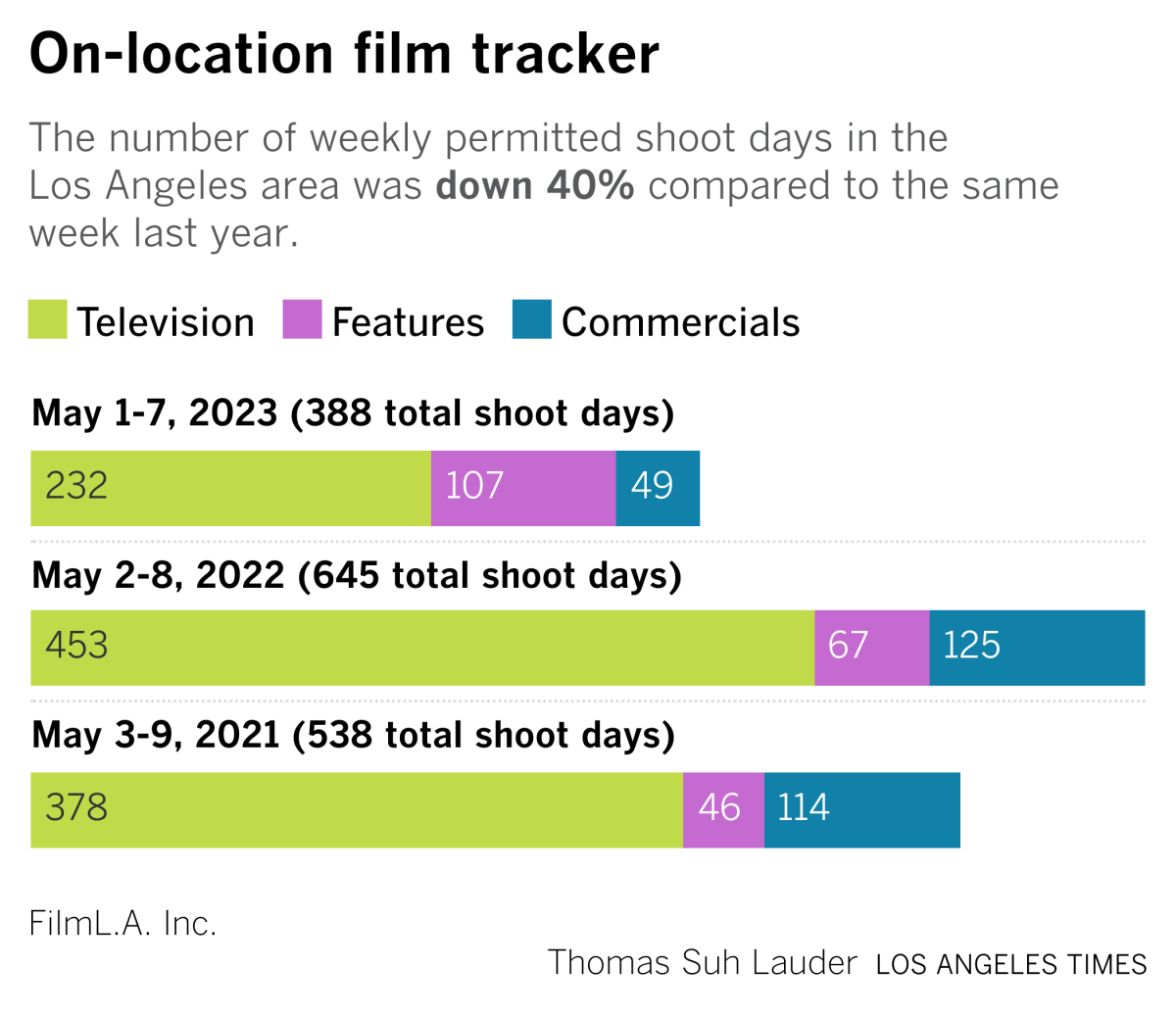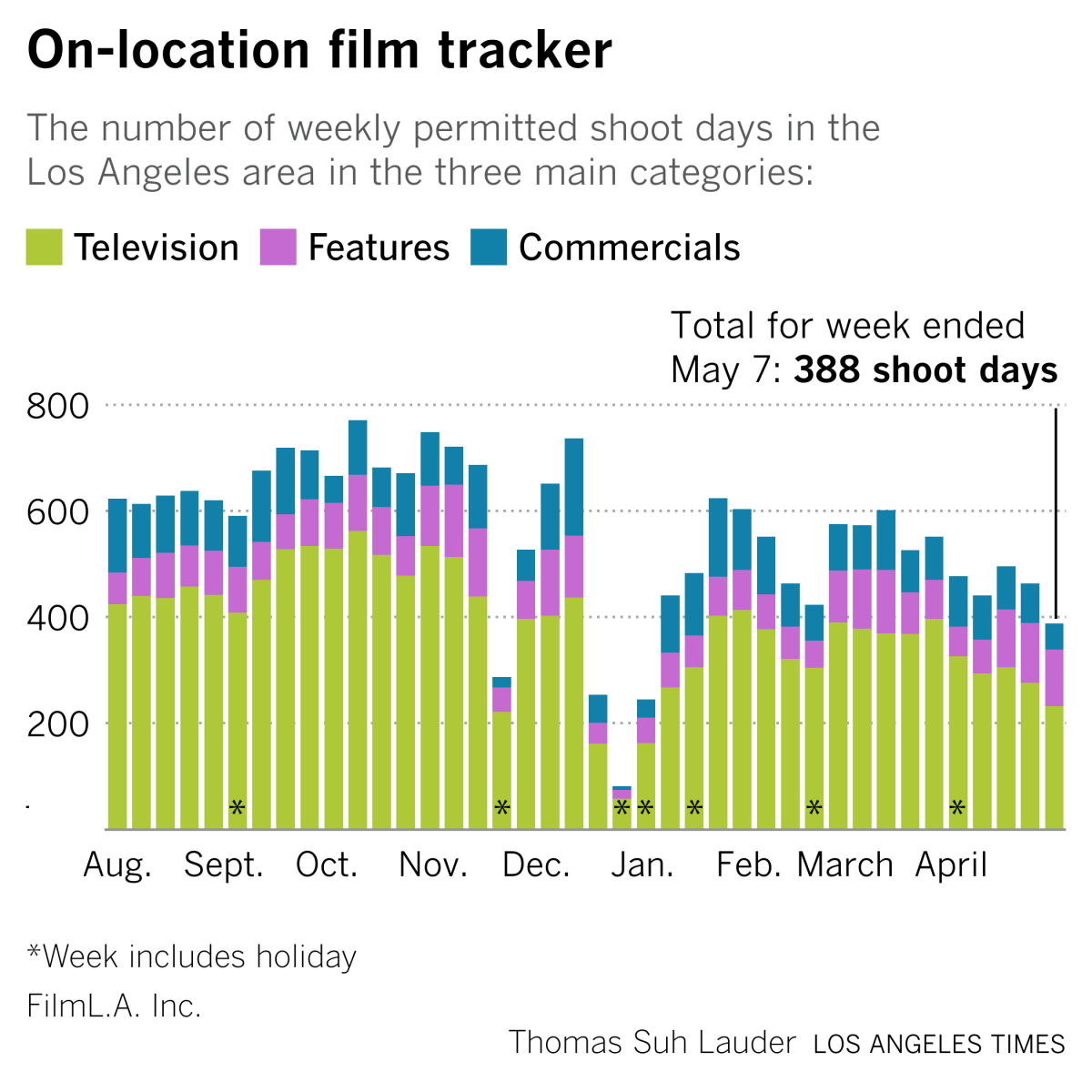The battle between Hollywood and its writers has always been ugly. It’s going to get worse

Welcome to the Wide Shot, a newsletter about the business of entertainment. Sign up here to get it in your inbox.
My colleague Stacy Perman this week dug into the history of writerly angst in Hollywood, where those with the literary gifts of William Faulkner, Dorothy Parker and F. Scott Fitzgerald became embittered by the so-called dream factories that lived up more to the second half of that term than the first.
That writers have long been downtrodden and disrespected workers on Tinseltown’s creative assembly line is the stuff of lore stretching back a century.
And no one could be more scathing in their scorn of screenwriting and its practitioners than the great authors themselves. “You don’t need any talent — the last thing you want is talent,” Parker, who helped write 1937’s “A Star is Born” and penned numerous forgettable films, once said of the art of the screenplay. Ouch. Almost stings worse than Tina Fey’s immortal writers’ room burn as “30 Rock’s” Liz Lemon (“Boy, we, as a group, might not smell great”).
So it’s no surprise that members of a long-dismissed profession have been girding for battle with their employers and are ready to dig in to get a better deal. And if the first week of the ongoing writers’ strike is any indication, neither side is going to crack soon and the dispute will get uglier as it progresses beyond the early burst of enthusiasm from the picket lines.
Studio chiefs are openly saying they think they have enough finished material to make it so that viewers won’t notice the strike for awhile. Netflix, where much of the WGA ire is focused, has a particularly well stocked cupboard of programming and a diverse slate of international productions. Behind the scenes, the companies are trying to keep the pipeline open by demanding that producers with dual roles (writer-showrunners) continue to perform their managerial duties during the strike. We’ll see how that plays out.
But writers are steadfast in their demands, and the impasse is already having a significant effect on production as big-name creatives and below-the-line workers demonstrate solidarity. Shoot days in the Los Angeles area have been declining amid the labor unrest, according to numbers from FilmLA.


The MTV Movie & TV Awards essentially went into clip-show mode, reminiscent of live programs during the height of the COVID-19 pandemic. The Duffer brothers announced the delay of production on Netflix’s “Stranger Things,” saying, “Writing does not stop when filming begins.” George R.R. Martin said the writers room for HBO’s upcoming “Game of Thrones” prequel had paused work, with the author going on the record with his “full and complete and unequivocal support” of the guild.
Negotiations begin Wednesday between the studios and another crucial union, the Directors Guild of America. The Alliance of Motion Picture and Television Producers, which represents the studios in labor dealings, is surely hoping a deal with the DGA will give it leverage against the typically more militant writers, in a repeat of what happened during the 2007-08 strike. But there are signs that the different guilds, facing similar issues, are more united this time around.
Not to be left unmentioned is the AI question, about which I hope to write more thoughtfully in the coming weeks.
The recent strides in generative artificial intelligence technology have made writers understandably worried that the studios will try to use automation to displace jobs of humans. Creative industries have typically been less vulnerable to technological advances than other sectors (personal computers certainly didn’t put screenwriters out of work). The issue is whether the descendants of ChatGPT will become tools to enhance writers’ contributions or replace them.
The recent examples of AI-generated chat-based text are impressive, no doubt.
Still, nothing I’ve seen so far gives me any confidence that they’ll be able to go beyond the blandest dialogue and story outlines anytime soon. Any chatbot entering a battle of wits with Parker or Fey is going to find itself humbly slinking back to a career of writing grocery lists.
But no one really knows how this is going to go. Technological shifts happen quickly and the writers are on a three-year contract cycle. They’ve learned from past negotiations that they have to think far into the future if they want to keep up with where the industry is headed.
Writers’ strike: ICYMI
— Some Hollywood writers are calling it ‘the Netflix strike.’ Here’s why.
— Why Hollywood writers’ strike won’t end soon. Here are six sticking points. Hollywood’s writers went on strike, but what were the issues that led to the fallout with the studios and streamers. Here are six issues where talks fell apart.
— As a Hollywood writers’ strike hobbles production, L.A. businesses brace for ripple effects. As productions shut down due to the writers’ strike, local prop houses, florists and caterers worry about their future and loss of work, as their business costs continue to rise.
— Impact of writers’ strike on L.A. economy could surpass 2007 stoppage, experts say. The writers’ strike, if it stretches on, could deliver a massive blow to the economy in Southern California. One expert predicted $3 billion or more in losses.
— Here are some of the cleverest signs from the WGA picket lines. Thousands of film and TV writers on strike joined picket lines in L.A. and across the nation. Many voiced their grievances through memorable signs. I liked the threat to spoil “Succession,” but let’s be honest, we already beat them to the punch on that one.
Leaky Fox-cet
A steady drip of revelations out of Fox News following Tucker Carlson’s ouster has been framed as providing a fuller explanation of the abrupt decision to ax the network’s most-watched host.
The idea that Fox Corp. executives were startled by Carlson’s bizarre “It’s not how white men fight” text was met with much skepticism, considering what he was known to say on the air. Jack Shafer at Politico had an interesting theory that leaks were meant to distract from the historic $787.5-million Dominion settlement.
Anyway, it’s not as if Fox is avoiding hosts who’ve made inflammatory statements on matters of race. Take a look at former Trump press secretary Kayleigh McEnany, who is getting a tryout in 8 p.m. Eastern hour that Carlson occupied. From my colleague Stephen Battaglio:
McEnany comes in with a head start on creating controversy as she made a racially offensive crack Friday on “Outnumbered,” the Fox News daytime show where she is a co-host.
McEnany introduced a discussion of a New York City protest over the May 1 killing of a Black homeless man by a Marine veteran on a subway train. Jordan Neely, 30, who had a history of mental illness and multiple arrests for assault, ranted and allegedly terrorized passengers before the veteran put him in a choke hold that police have determined caused his death.
After coming out of video showing a drum-beating mixed-race crowd chanting about Neely’s death, McEnany said “Justice or burn it down — well at least they have rhythm,” evoking a stereotype about Black people.
Number of the week

James Gunn’s “Guardians of the Galaxy Vol. 3” opened with $118.4 million in domestic ticket sales, a bit higher than Disney had previously projected because the drop in business from Saturday to Sunday was smaller than expected.
That puts the film in line with pre-weekend forecasts but still down almost 20% from the debut of the second “Guardians,” which took in $146.5 million from the U.S. and Canada when it launched in May 2017, a time when Marvel could do no wrong.
Next weekend will be the big test for “Vol. 3.” The strong Sunday hold is an early sign that audiences are responding positively, unlike with some other recent Marvel Studios titles.
International grosses came in at $170.9 million Monday, also higher than initially stated.
The revised numbers are good news for Marvel but won’t quiet those who’ve started to smell “superhero fatigue” again.
My Times colleagues last week published an interesting piece examining L.A.-area fans’ complicated feelings about the recent direction and performance of the Marvel Studios films under Disney, including the disappointing “Ant-Man and the Wasp: Quantumania.”
Gunn, who shook up the superhero genre with the first “Guardians,” now works for Disney rival Warner Bros. Discovery as co-chief of DC Studios, where he has been criticizing the industry for the sameness that has become prevalent in comic book-based stories. And he’s just kind of tweeting through it too?
Never boring, this guy.
Best of the web
— Vice Media nears a $400-million deal to out of bankruptcy. (Wall Street Journal)
— This Liz Holmes person sure sounds trustworthy. (New York Times)
— Paramount can’t say no to the man behind ‘Yellowstone.’ (WSJ)
— Millennials love Steely Dan? Unironically? Good. (L.A. Times)
Finally ...
Congratulations to all my colleagues who were honored by the Pulitzer Prizes on Monday.
The paper’s staff won the Pulitzer for breaking news for a series of stories on a secret audio recording that exposed Los Angeles City Council members scheming in a crass and racist session about political power in the city.
Christina House won the feature photography award for images of a young woman living alongside the Hollywood Freeway while coping with drug issues and the birth of a child.
The Times staff also was recognized as a finalist in the local reporting category for the “Legal Weed, Broken Promises” series on the fallout of legal pot in California.
The Wide Shot is going to Sundance!
We’re sending daily dispatches from Park City throughout the festival’s first weekend. Sign up here for all things Sundance, plus a regular diet of news, analysis and insights on the business of Hollywood, from streaming wars to production.
You may occasionally receive promotional content from the Los Angeles Times.




